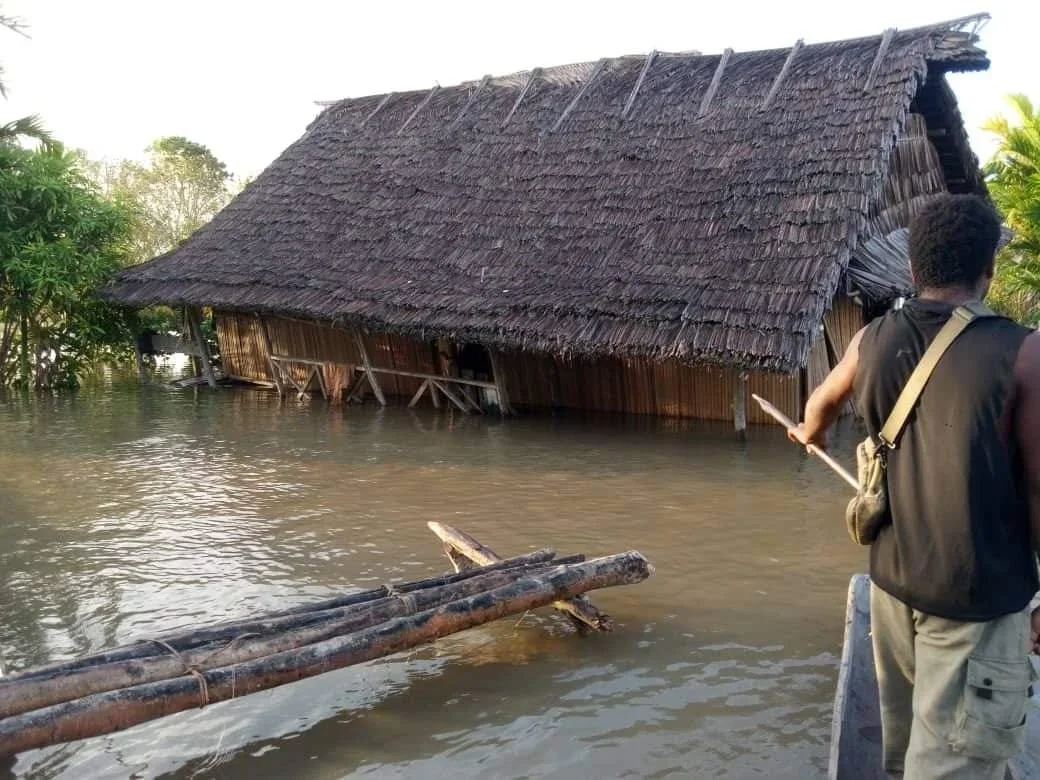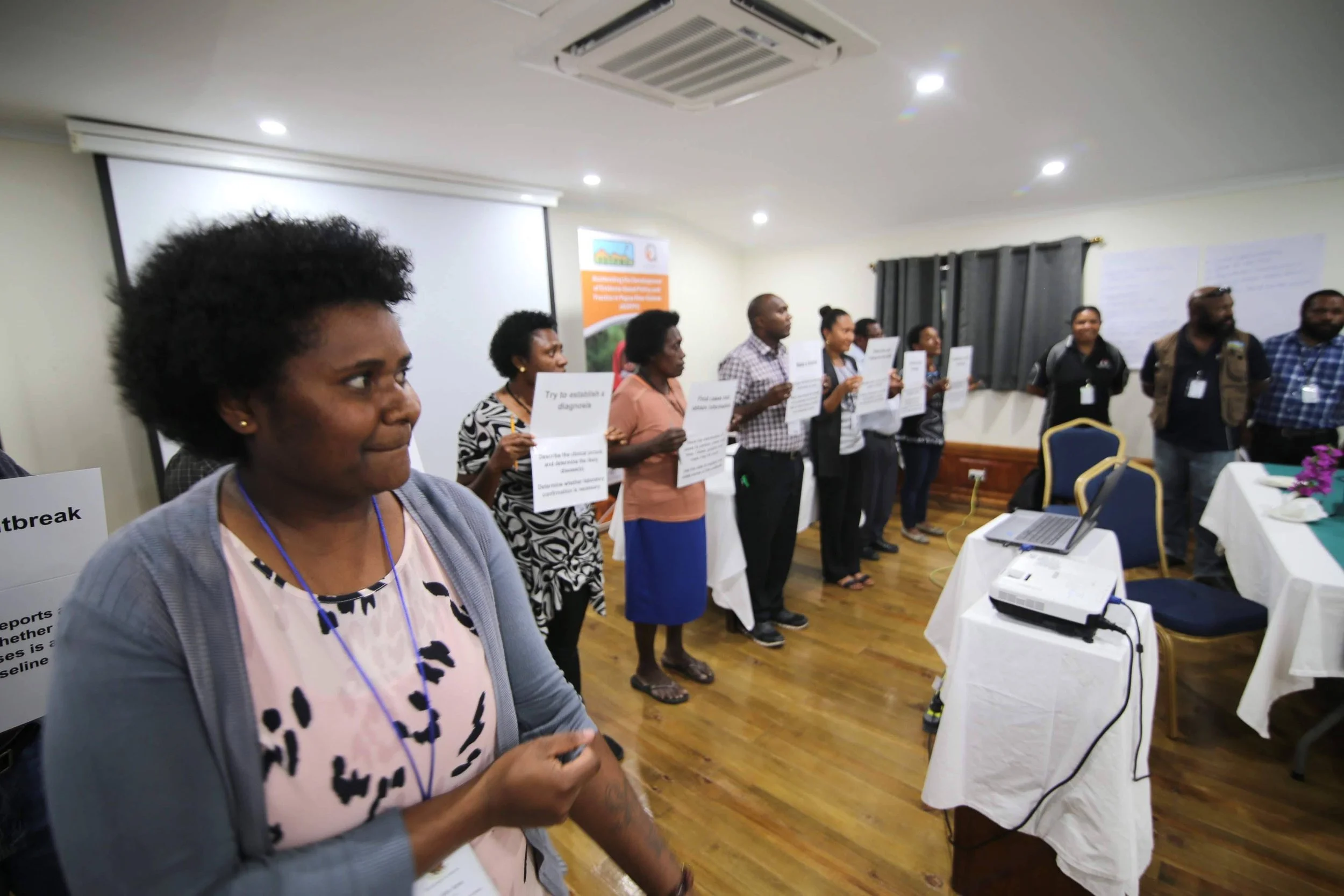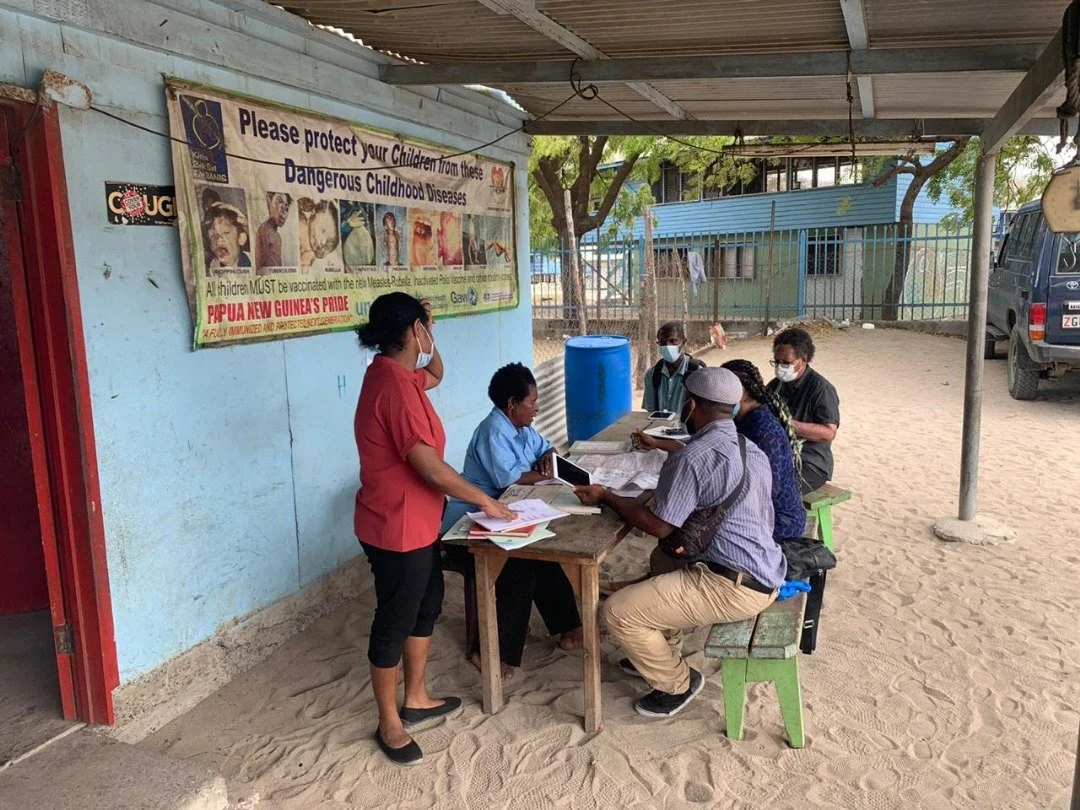Making our Mark: World Field Epidemiology Day 2025
Written by James Flint - 5 Sep 2025
Each year, World Field Epidemiology Day (WFED) shines a spotlight on the professionals who keep their communities safe from disease. The 2025 theme of “Making Our Mark: Field Epidemiology in Action” resonates deeply with our team.
East Sepik Provincial Health Authority Service Vehicles
This year the Field Epidemiology in Action (FEiA) team celebrates the dedication and hard work of field epidemiologists across the Pacific and around the world.
We are privileged to support our Pacific colleagues in establishing and delivering high-impact Field Epidemiology Training Programs (FETPs). These programs are learner-centred and Pacific-led, designed to build a workforce ready to tackle persistent, recurring, or unforeseen health threats in every community.
Across the Pacific, field epidemiologists work tirelessly, often in the harshest of conditions. Each year, they save countless lives by using data to drive evidence-based decisions. They have led rapid response teams after earthquakes and floods, used data to improve vaccination coverage, and strengthened surveillance systems to detect outbreaks. They have helped construct ‘waiting houses’ for pregnant women to allow them to have a supervised delivery, implemented public health programs during tribal conflicts, and trekked for days to reach remote communities affected by infectious disease outbreaks.
Below are just a few stories from FETP graduates from Papua New Guinea who have applied their field epidemiology skills to make a difference in their communities - each capturing the spirit field epidemiology in action. Each making a mark.
Stanley
Bernie Smaghi, Stanley Masi & James Flint at the extended FETPNG graduation, 2022
FETPNG graduate Stanley Masi led a high-impact immunisation campaign that transformed health outcomes in one of Papua New Guinea’s most remote districts. Armed with the skills and confidence gained through his training, Stanley and his team crossed rivers, trekked for days, and negotiated with hesitant communities to deliver oral polio vaccines and vitamin A supplements. Their efforts paid off - exceeding the 95% coverage target in every part of the district.
“Because of what I learned through FETPNG… I knew that with the right approach and persistence, we could succeed.”
Once having the lowest vaccine coverage rates in the province, Stanley’s district is now recognised as one of the best in the country thanks to strong leadership and data-driven public health action.
Stanley Masi (centre, back row) and his vaccination team showing the awards they received from the Provincial Health Authority for achieving the highest vaccine coverage in East Sepik Province.
Julianne
Julianne Gumbat
When a powerful earthquake and flooding struck East Sepik Province, FETPNG graduate Julianne Gumbat stepped up to lead the Rapid Response Team for Ambunti district. Drawing on her training, she coordinated a multi-disciplinary team, conducted urgent needs assessments, and used monitoring and evaluation tools to guide a focused and effective response.
“FETP taught me how to bring structure and purpose to emergency situations”
Julianne applied her training to use data to identify health risks, develop a realistic budget, and make evidence-based recommendations. From waterborne diseases to the need for mobile clinics and mental health support, Julianne’s leadership helped protect vulnerable communities in a time of crisis.
Assessing the damage caused from the earthquake and flooding
Judith
Judith Ame (left) participating in a workshop during the Advanced FETPNG program
When routine immunisation faltered in one province, pentavalent vaccine coverage dropped to a critically low 23 percent. FETP graduate, Judith Ame, stepped forward to turn the situation around. Using the operational research and intervention design skills gained through FETPNG, she led a project to uncover barriers and co-create solutions with the communities most at risk of diphtheria, pertussis, tetanus, hepatitis B and Haemophilius influenzae type-B (Hib) outbreaks.
Through questionnaires and interviews with health workers, mothers, and local leaders, her team identified the real obstacles: poor communication of outreach schedules and weak coordination between health facilities and villages. To address these, she brought stakeholders together in a Human-Centred Design workshop, where two practical interventions emerged.
The first focused on data. She developed a simple tool that frontline health workers could use to review their own immunisation data, identify under-served communities, and plan outreach more strategically. By inviting community leaders to sit with them during the reviews, health workers ensured outreach sessions matched the rhythms of village life, avoiding missed opportunities when families were away in the fields.
The second intervention mobilised local resources. Volunteers from within the community were trained to go door-to-door, reminding mothers of vaccination days. To ensure sustainability, she organised a training-of-trainers program so health workers could continue equipping new volunteers in the future.
To bring it all together, she established a technical working group for immunisation, uniting health staff, leaders, and partners to review data, coordinate outreach, and share resources. She personally developed training materials, delivered workshops, and led monitoring and evaluation visits.
The results were striking. Pentavalent coverage more than doubled, rising from 23 to 62 percent. Health facilities became more effective, communities took greater ownership, and coordination across the system was strengthened.
“This project showed me how data and community engagement can change lives… it is one of my proudest achievements.”
Judith (left) and her team during the data collection
About FEiA
Based at the University of Newcastle and Hunter New England Health, FEiA partners with governments to establish and strengthen field epidemiology and Rapid Response Team training programs. We are supported by the Australian Government through the Australian Aid program, along with additional support from donors including Global Fund, Pandemic Fund, World Vision, World Health Organization, and the World Bank.
Our focus is on building resilient workforces that create lasting change, including through:
Frontline (One Health) Field Epidemiology Training Programs
Intermediate Field Epidemiology Training Programs
Extended Field Epidemiology Training Program
Rapid Response Team Training
Our team of experts is focused on developing high impact training programs that are co-designed and fully contextualised to meet the specific needs of country partners. We use adult learning theory to drive interactive and innovative training, aiming for transformational change. Our programs recognise the existing expertise of adult learners, and support higher learning through workshops, mentoring, and applied field projects to build practical skills in disease surveillance, outbreak detection, response, and prevention.
Additionally, we offer online eLearning courses and other resources, freely available to the global field epidemiology community. Available here.
About Field Epi in Action







